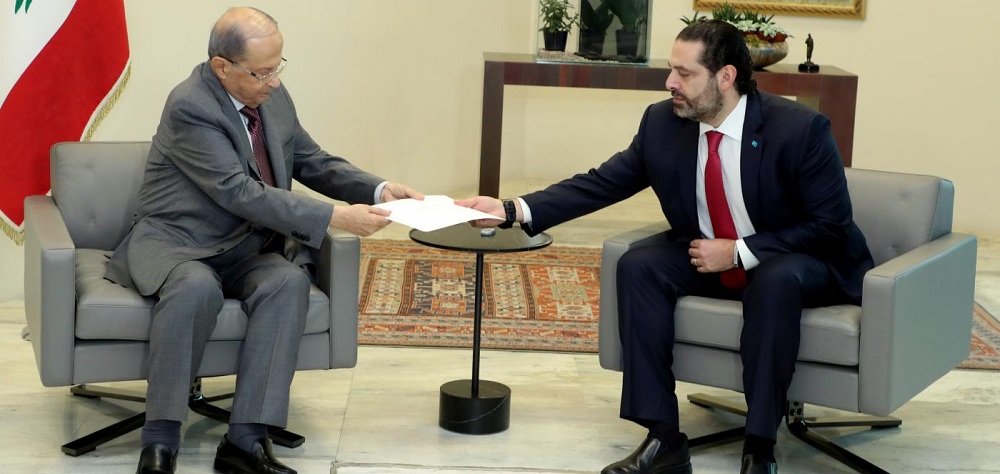Alwaght- While presenting new cabinet to President Michel Aoun by Prime Minister Saad Hariri marks a step towards ending political crisis in Lebanon and filling the several-month vacuum of power after the huge Beirut port blast in August that led to the resignation of Prime Minister Hassan Diab the local media reported on Friday that Aoun rejected the proposed cabinet.
The list was presented for the first time since Hariri was named PM and tasked with the formation of a new government on October 22.
Al-Jumhuriya newspaper, citing an anonymous source, reported about the rejection of the new cabinet, saying that Hariri coordinated neither with the Shiite parties of Hezbollah and Amal nor with the Progressive Socialist Party (PSP) .
Walid Jumblatt, leader of the PSP, on Tuesday in an interview with An-Nahar newspaper held that there have been no contacts between him and Hariri over the share of the Druzes in the new government. Sheikh Naeem Qassem of Hezbollah in an interview to Al-Manar television said that there were no communications between Hezbollah and Hariri about the selection of Shiite ministers to the new cabinet.
Concerning Christian ministers, a proposal was presented without discussions with the Christian parties like Free Patriotic Front (FPF), Tashnag Party, and also Marada Movement, informed sources from Baabada Presidential Palace noted. They also said that the lengthy difference between Aoun and Hariri over naming Christian is the major obstacle ahead of the cabinet formation. In fact, Aoun-Hariri’s difference remains persistent over naming 9 Christian ministers in the 18-member proposed cabinet of nonpartisan, technocratic government aimed at making instant reforms.
Another sticking point is Hariri’s push to give four key ministries of defense, interior, finance, and foreign affairs to specific figures under what he calls “independent ministries” plan.
The deadlock in the cabinet formation comes while Lebanon is struggling with a string of crises, including the economic crisis, the worrisome surge in coronavirus tolls, and the grave consequences of Beirut port that killed over 200 people, displaced 300,000, and left the country with billions of dollars in damage.
Targeted pressure on Hezbollah
Hariri’s insistence to continue the past approach of not consulting with the leading political parties and groups in the cabinet formation and moving to drive out Hezbollah and the allied forces under the March 8 Alliance comes as in the past such a path proved itself to be a failure. This path showed its defeat the last time in the PM Mustafa Adib government formation process. The efforts by Hariri to marginalize Hezbollah as part of an American-Saudi plan this time are accompanied by a heavy wave of media propaganda along with the already-existing economic pressures on the resistant movement.
Over the past few days, amid a struggle to paint Hassan Diab, the resigned PM who was close to Hezbollah and its allies, as the main one to blame for the devastating explosion following a case opened by a judge, the verdict of the special tribunal of Rafic Hariri, the Lebanese Prime Minister who was killed in a 2005 car blast in Beirut, gave the opponents another excuse to bring under propagandistic fire the resistant force in Lebanon.
On Friday, the court in its final verdict convicted Jamil Ayyash, a member of Hezbollah, to five life terms. Following the ruling, Hariri said that the sentence should be implemented and the judicial and security officials of the country should do their job. Apparently, Hariri is seeking to abuse the case against Hezbollah as part of a political campaign although in August the court cleared the movement from the case.
Experts argue that naming the cabinet members in such an atmosphere is throwing the ball in Aoun and Hezbollah’s court. Whereas amid a sheer economic crisis Lebanese nation expect the political groups to form a government and address the challenges as soon as possible, President Emanuel Macron of France recently warned that if before his December trip to Beirut a credible government is not formed, Lebanon would not enjoy a possible international financial aid package. On December 2, Paris hosted the Lebanon aid conference and told of the foundation of a fund under the supervision of the World Bank to help Lebanon. Regardless of its benefits to Lebanon, the move brings the political factions under public pressure to bow to Hariri excesses.
These factors make Hariri, whose third government collapsed following popular protests against corruption and bad economic conditions, find another opportunity to monopolize the power.



























